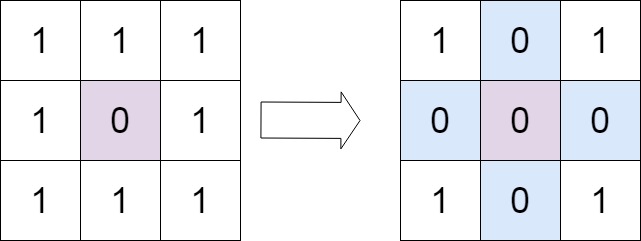LeetCode in Cpp
73. Set Matrix Zeroes
Medium
Given an m x n integer matrix matrix, if an element is 0, set its entire row and column to 0’s, and return the matrix.
You must do it in place.
Example 1:

Input: matrix = [[1,1,1],[1,0,1],[1,1,1]]
Output: [[1,0,1],[0,0,0],[1,0,1]]
Example 2:

Input: matrix = [[0,1,2,0],[3,4,5,2],[1,3,1,5]]
Output: [[0,0,0,0],[0,4,5,0],[0,3,1,0]]
Constraints:
m == matrix.lengthn == matrix[0].length1 <= m, n <= 200-231 <= matrix[i][j] <= 231 - 1
Follow up:
- A straightforward solution using
O(mn)space is probably a bad idea. - A simple improvement uses
O(m + n)space, but still not the best solution. - Could you devise a constant space solution?
Solution
#include <vector>
class Solution {
public:
void setZeroes(std::vector<std::vector<int>>& matrix) {
int m = matrix.size();
int n = matrix[0].size();
bool row0 = false;
bool col0 = false;
// Check if 0th column needs to be marked all 0s in the future
for (int i = 0; i < m; i++) {
if (matrix[i][0] == 0) {
col0 = true;
break;
}
}
// Check if 0th row needs to be marked all 0s in the future
for (int j = 0; j < n; j++) {
if (matrix[0][j] == 0) {
row0 = true;
break;
}
}
// Store the signals in the 0th row and column
for (int i = 1; i < m; i++) {
for (int j = 1; j < n; j++) {
if (matrix[i][j] == 0) {
matrix[i][0] = 0;
matrix[0][j] = 0;
}
}
}
// Mark 0 for all cells based on signals from the 0th row and 0th column
for (int i = 1; i < m; i++) {
for (int j = 1; j < n; j++) {
if (matrix[i][0] == 0 || matrix[0][j] == 0) {
matrix[i][j] = 0;
}
}
}
// Set 0th column
if (col0) {
for (int i = 0; i < m; i++) {
matrix[i][0] = 0;
}
}
// Set 0th row
if (row0) {
for (int j = 0; j < n; j++) {
matrix[0][j] = 0;
}
}
}
};

